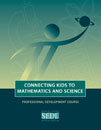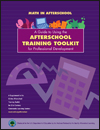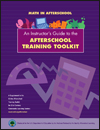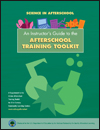SEDL's Free Guides and Toolkits for Mathematics and Science
Mathematics and Science
Guides and Toolkits
Connecting Kids to Mathematics and Science (2012)
This nine-session professional development course provides teachers in grades 4–8 with hands-on experience in integrating mathematics, science, and technology in the classroom. The course is designed for use by an experienced trainer or facilitator and is available online free of charge.
This nine-session professional development course provides teachers in grades 4–8 with hands-on experience in integrating mathematics, science, and technology in the classroom. The course is designed for use by an experienced trainer or facilitator and is available online free of charge.
Math in Afterschool: A Guide to Using the Afterschool Training Toolkit for Professional Development (2008)
The Afterschool Training Toolkit materials are designed to illustrate techniques and activities that leverage student curiosity to make mathematics in afterschool both enjoyable and relevant. This guide provides professional development ideas for each of the seven promising practices in afterschool math enrichment.
The Afterschool Training Toolkit materials are designed to illustrate techniques and activities that leverage student curiosity to make mathematics in afterschool both enjoyable and relevant. This guide provides professional development ideas for each of the seven promising practices in afterschool math enrichment.
Math in Afterschool: An Instructor's Guide to the Afterschool Training Toolkit (2008)
The seven promising practices in afterschool math identified in the Afterschool Training Toolkit are as follows: Finding Math; Math Centers; Math Games; Math Projects; Math Tools; Math Tutoring; Family Connections. When used with the Afterschool Training Toolkit, the lessons in this instructor’s guide will help you master these promising practices. Once you become proficient at these practices, you should be able to use them to develop other math lessons.
The seven promising practices in afterschool math identified in the Afterschool Training Toolkit are as follows: Finding Math; Math Centers; Math Games; Math Projects; Math Tools; Math Tutoring; Family Connections. When used with the Afterschool Training Toolkit, the lessons in this instructor’s guide will help you master these promising practices. Once you become proficient at these practices, you should be able to use them to develop other math lessons.
Science in Afterschool: An Instructor's Guide to the Afterschool Training Toolkit (2008)
The five promising practices in afterschool for science identified in the Afterschool Training Toolkit are as follows: Investigating Science Through Inquiry; Exploring Science Through Projects and Problems; Integrating Science Across the Curriculum; Engaging Families and Communities in Science; Tutoring to Enhance Science Skills. When used with the Afterschool Training Toolkit, the lessons in this instructor’s guide will help you master these promising practices. Once you become proficient at these practices, you should be able to use them to develop other science lessons.
The five promising practices in afterschool for science identified in the Afterschool Training Toolkit are as follows: Investigating Science Through Inquiry; Exploring Science Through Projects and Problems; Integrating Science Across the Curriculum; Engaging Families and Communities in Science; Tutoring to Enhance Science Skills. When used with the Afterschool Training Toolkit, the lessons in this instructor’s guide will help you master these promising practices. Once you become proficient at these practices, you should be able to use them to develop other science lessons.




